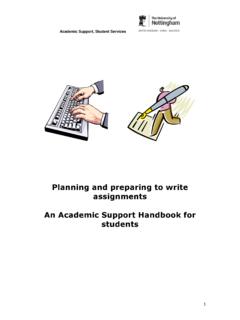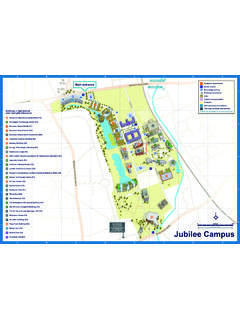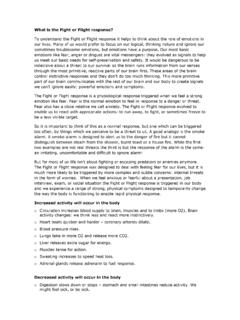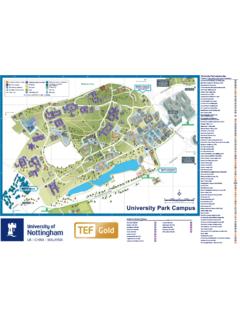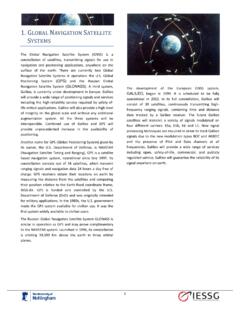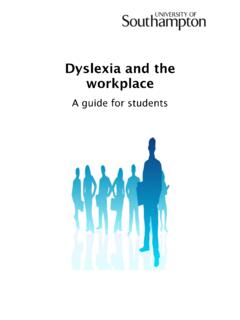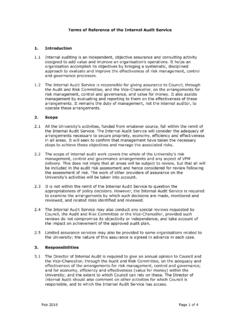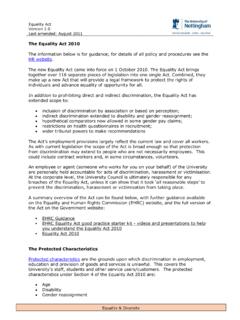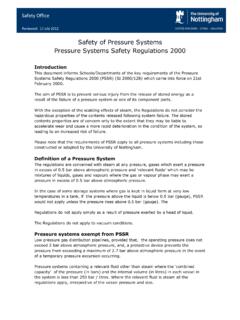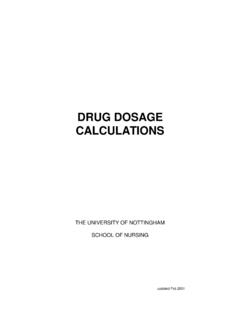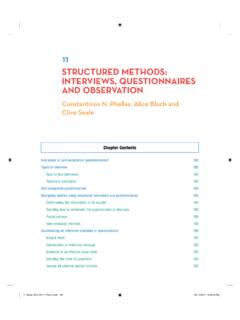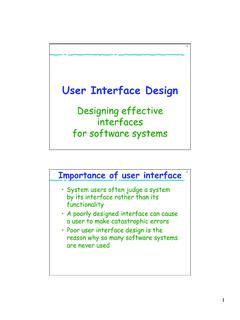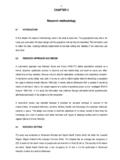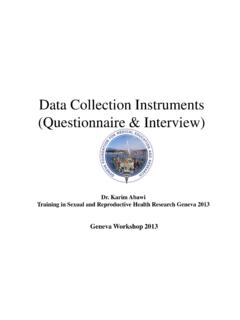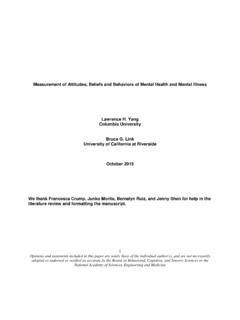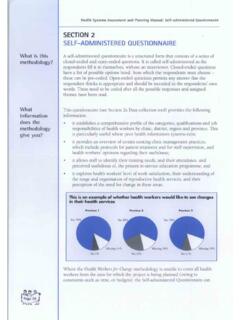Transcription of Measuring Personality Constructs: The Advantages and ...
1 Jennifer Dodorico McDonald, University of Cambridge Abstract Achieving construct validity, or using measures that accurately represent particular theoretical constructs, is an important goal of social science research. This article reviews arguments regarding the strengths and limitations of Personality assessment methods in terms of methodological feasibility and whether they are accurate in Measuring Personality constructs. Specifically, it considers the Advantages and disadvantages of assessing Personality with self-report questionnaires, informant reports, and behavioural measures.
2 Acknowledging that no method is perfect, the discussion then focuses on the value of incorporating multiple methods. In light of the reliance on the self-report method in Personality psychology, it will be argued that researchers could maximize the validity of the measurement of Personality constructs by combining the questionnaire approach with other methods. Introduction According to Cronbach and Meehl (1955), psychological and Personality constructs are postulated or inferred characteristics or traits of a person. There are many constructs, or concepts, in psychology that are not tangible; if we cannot physically see Personality traits, for instance, there is the potential to question whether they are really there.
3 Is it possible to measure such an abstraction as Conscientiousness in the way that physical attributes, like height, are assessed? Social scientists have been making inferences about what people are like and thus Measuring these sorts of hypothetical constructs for years, which is necessary in order to more fully understand how people behave (Smith, 2005). Smith points out, though, that it is important to ensure that these theoretical constructs are measured in a convincing, valid way (p. 396). In general, validity of a measurement device refers to the extent to which it actually measures what it intends to measure.
4 Construct validity, then, refers to the accuracy of a measurement of the theoretical concept ( John & Soto, 2007; Messick, 1995; Ozer, 1999). Therefore, abstract Personality constructs can only be accepted and made more concrete if the validity of the methods used to measure them can be ascertained. Measuring Personality Constructs: The Ad vantages and Disadvantages of Self-R e p o r t s , I n f o r m a n t R e p o r t s a n d Behavioural Assessments Enquire 1(1): 75-94 The Author, 2008 75 Enquire 1(1) This paper will focus on evaluating the usefulness and accuracy of different methods of Measuring Personality constructs.
5 According to Pervin (1999), the determining of the best methods of Measuring Personality constructs is one of the most prominent issues in Personality psychology. The central debate involves the accuracy of self-report data in obtaining information about an individual s Personality , in comparison with ratings from others or the use of alternative methods of assessment. This is especially important in light of recent questionnaire findings that suggest that Personality psychologists primarily rely on self-report measures, yet belong to a methodologically diverse field overall (Robins, Tracy, & Sherman, 2007).
6 Here, I will discuss the value of considering self-reports, informant or observer reports, and behavioural measures, by presenting the Advantages and disadvantages of each of these methods. I will assert that it is not sufficient to simply assume the accuracy of any one measure in fully representing the desired Personality trait. I will demonstrate this by briefly addressing issues related to construct validity. Overall, this paper will suggest that a variety of methods should be employed in assessing Personality constructs.
7 Self-Reports Advantages and disadvantages of self-reports In order to later propose that more than one method is required to obtain more accurate understandings of Personality constructs, I will discuss the value of the most common measure: self-reports. Using objective self-reports, or asking people directly for information relating to a particular construct, is extremely prevalent in most areas of the social sciences, including Personality psychology (Schwarz, 1999). In the field of Personality psychology, asking people to respond to questions or statements about what they are like or how they behave seems to be the most preferred method.
8 According to an analysis conducted by Vazire (2006), 98% of the studies assessing Personality traits published in the Journal of Research in Personality in 2003 used self-report measures. Moreover, in 70% of these studies, the self-report was the only measure that was used. More than 95% of studies reported in the Journal of Personality in 2006 used self-report questionnaires (Kagan, 2007). Research by Robins and colleagues (2007) similarly found that, though a variety of methods are accepted by the Personality psychologists that they polled, self-reports are by far the most frequently used (p.)
9 677). Clearly, the questionnaire is perceived as central to Measuring constructs. On the surface, the fact that obtaining self-reported data is so popular makes complete sense if I want to learn more about somebody, why would I 76 Dodorico McDonald not go directly to that person? One would expect that the individual possessing the particular Personality traits should be able to provide the most informative and accurate information about these constructs. In accordance with the basic foundation of such models as the five-factor theory of Personality , people can convey a vast amount of information about themselves through the expression of certain relatively enduring patterns of thoughts, feelings, and actions (McCrae & Costa, 1999, p.
10 140). Correspondingly, these Big Five traits (namely Extraversion, Agreeableness, Conscientiousness, Neuroticism, and Openness) can be directly assessed through carefully constructed Personality questionnaires, such as John and Srivastava s (1999) Big Five Inventory or Costa and McCrae s (1992) NEO-PIR, which measures the five factors as well as more specific facets of the traits. Paulhus and Vazire (2007) remind us that no one else has access to more information than oneself, and that this information is rich with motivational and other introspective details that others might not be aware of (p.
